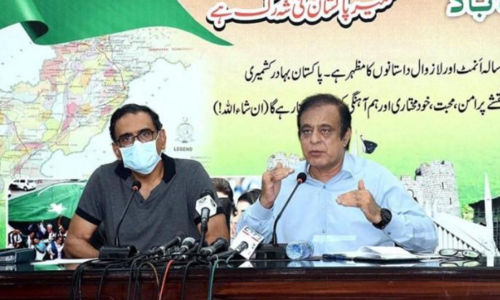Prime Minister Imran Khan on Wednesday underscored the need for consensus among provinces and the federal government on the issue of gas, saying that if the country was falling behind, a province could not progress either.
Addressing a seminar on 'Sustainability, Security and Affordability of Natural Gas Supply in Pakistan', the premier said that the country could not progress without equitable growth.
Talking about the shortage of gas in the country, he highlighted the problems faced by the provinces. "Punjab has a deficit and is facing problems. Khyber Pakhtunkhwa says that it uses very little of the gas it produces," he said.
He expressed hope that the participants of the seminar, led by Special Assistant to the Prime Minister (SAPM) on Petroleum Nadeem Babar, would reach a consensus.
The premier warned that the country was heading towards a gas crisis. "I am alarmed because there will be a problem this winter but an even bigger problem next winter," he said.
His comments came a day after the federal government warned of an impending serious gas shortage, saying that Article 158 of the Constitution that promised priority rights to gas producing provinces was becoming irrelevant and all stakeholders would have to reach a consensus on a workable way forward.
“We will be going towards massive (gas) load shedding in the coming days. We have to find a solution today how to increase supplies,” SAPM Babar said at a news conference with Federal Energy Minister Omar Ayub Khan on Tuesday.
Babar said "the issue of Article 158 of the Constitution had been pending for 10 years and had since been taken over by other ground realities and more serious issues". Based on demand growth and domestic gas production even if utilised in gas-producing provinces, Sindh would be facing gas shortfall in one and half years, followed by Khyber Pakhtunkhwa in two and half years and Balochistan in about three and half years, he said.
Addressing the participants at the seminar, the premier said that they should consider national interests. "It is very important that consensus building happens and there is awareness among the masses so they take the right decision," he said.
"When there is no consensus, provinces start feeling like they are being sidelined."
Emphasis on long-term planning
The prime minister also emphasised the importance of debates on matters of national interest. He gave the example of China, who he said had "developed at a rapid pace not seen before" because the government had a robust system of debates.
"They have splendid debates. They have a great system of meritocracy and their leadership reaches the positions they are at through rigorous struggle. Secondly, they have great long-term planning. This is very important," the premier said.
"When a country does long-term planning, then it avoids situations like the one Pakistan is stuck in today," he added.
The premier said that Pakistan had a lot of potential in the hydro-electricity sector but it had not been utilised because previous governments did not focus on it.
"No one thought of it because our system is such that [political parties] plan only for elections so they can get immediate results. Nobody thought about it, even during military rule.
"If we had debated about what kind of energy mix Pakistan should have and what fuel should have been used to generate electricity sooner, our industry would not be in trouble today and our people would not be burdened."
Subsidies not being used for 'original purpose'
Referring to subsidies, the prime minister said that they were not being used for their "original purpose".
"Subsidies are given for two reasons: to lift people up and to create wealth. Subsidies should increase wealth, GDP, per capita income and for a country like ours, [help with] returning loans. The recent presentation I received on subsidies revealed that totally different people are taking subsidies," he said.
He expressed the hope that the seminar would also discuss alternate sources of gas and power generation. He thanked the independent power producers (IPPs) for their agreement with the government.
"I am very thankful to IPPs because the agreement with them will provide a huge relief for the people."
"The debate in the seminar is very important to see where we are going, how to tackle our depleting gas reserves and the difference between locally produced and imported gas," he said.
"There is such a big gulf between the imported gas and the price we sell it at which is increasing our circular debt. We are producing electricity at Rs17 per unit but selling it at Rs14 per unit which is adding to our circular debt," the premier said.
He added that he hoped the seminar would present a roadmap for the future on its conclusion.















































